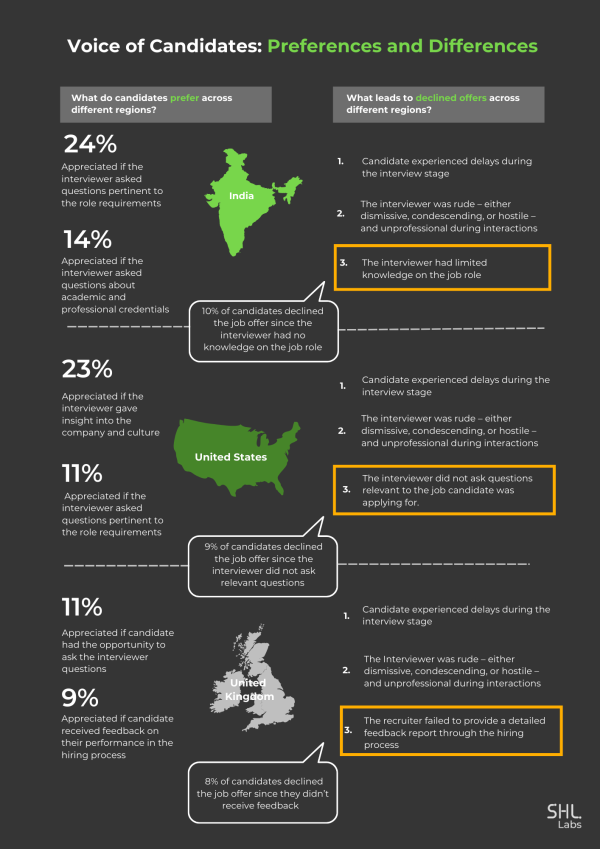AI-powered Insights to Decipher Candidate Preferences Across the US, UK, and India
Understanding candidate preferences based on an analysis of 400,000+ candidates' reviews on their interview experience, from the US, UK, and India.
Share
Wake up and smell the coffee! Employers no longer hold all the power in hiring. Providing a superior candidate experience is crucial for businesses to thrive and remain competitive in the hiring market. We are in the midst of a candidate-driven revolution. Interactions with both successful and unsuccessful candidates carry weight, as they become influencers and, more than ever, likely to post their experiences online. Our recent research shows a 2x increase in candidates sharing their interview experiences since 2020.
A candidate’s experience may be impacted by a number of factors, some of which the organization may not have full visibility. For example, organizations may not fully understand how key actors, such as recruiters, or interviewers are behaving during interviews and how those behaviors might be impacting the overall candidate experience. Additionally, the hiring process will certainly impact the candidate experience, but organizations may not know the degree to which their process is being followed by those on the ground. The impact of poor candidate experience is significant as it is likely to lead to more declined offers, so quite important to get right.
Conventional surveys limit candidate insights with pre-determined options. Flipping the lens, SHL Labs embraced open-ended feedback which uncovered richer, and more authentic perspectives from candidates. We analyzed 400K+ candidate reviews posted on top platforms like Glassdoor, LinkedIn, Indeed, and Twitter (now known as X). Using our proprietary Texts-to-Insights platform, we derived actionable insights on job seekers' expectations, uncovering many aspects that were not explored earlier. We published detailed insights in the eBook - ‘Voice of Candidate: What Your Hiring Process— and Candidates—Say about You’. Some of the insights have been summarized here:
- The number of negative interview experiences has doubled (2x rise) since 2020.
- 42% of candidates declined the job offer because of negative interview experience. This has increased by 3X since 2020.
- Inefficient hiring process: 52% of candidates blamed it for their negative interview experience.
- Interviewer: 45% of candidates attributed their negative experience to this.
- Recruiter: 23% of candidates held the recruiter responsible for their negative interview experience.
Today's organizations are becoming more global and boundaryless. They actively conduct region-specific research to tailor their products and solutions. However, it is quite surprising that candidate experiences and expectations are often overlooked on a regional level. Shouldn't we delve deeper into understanding the unique psyche of candidates in each region?
Building up on our previous analysis, this blog reveals intriguing regional differences in candidate expectations, reflecting the unique preferences and nuances of candidates in different regions. Our data predominantly comprises insights from India (38%), followed by the US (34%), the UK (7%), and other countries (21%).

What leads to declined offers across different regions?
Across all three regions, two prominent factors emerged as common causes for declined job offers:
- Delays in the overall hiring process: Candidates highly value a timely and efficient hiring process, and any undue delays can lead to frustration and disinterest in the job role.
- Rude behavior exhibited by interviewers: Rude behavior from interviewers, including being dismissive, condescending, or hostile, significantly and negatively impacts a candidate's perception of the company. Unprofessional conduct such as interrupting the candidate, asking inappropriate questions, or being disrespectful further contributes to a negative interview experience.
In addition to these shared similarities, the following key factors emerged across different regions as significant reasons for negative interview experiences or candidates rejecting job offers:
- India: Lack of interviewer's job knowledge is not appreciated by Indian candidates
Indian candidates are more likely to decline job offers when the interviewer demonstrates a lack of knowledge about the specific job application. This includes asking questions that are irrelevant to the applied role or showing a general unawareness of the position. Candidates invest a lot of time and effort in preparing for the interview, so it is fair to expect interviewers to have a basic understanding of the job requirements and relevant industry knowledge. - US: Asking irrelevant or personal questions is highlighted by candidates
US candidates have expressed dissatisfaction with interviewers who ask questions unrelated to the position or the purpose of the interview, such as inquiries about marital status, gender, religion, or political preferences. - UK: Candidates faced negative interview experiences since they did not receive feedback
UK candidates place a strong emphasis on the post-interview experience, particularly the importance of receiving feedback. 18% of UK candidates had negative interview experiences due to not receiving feedback after the interview process. This lack of communication leaves candidates uncertain about their performance and prospects.
What do candidates like across different regions?
- India: Candidates prefer engaging in meaningful conversations about the role and educational background
A significant 24% of Indian candidates prioritize an interview process that revolves around relevant questions and engaging discussions. They value the opportunity to showcase their knowledge and skills. Within the Indian candidate pool, 14% have expressed appreciation when interviewers ask about their educational background. - US: Candidates appreciate the interviewer’s briefs about the company’s values and culture
Discussing company culture during interviews is highly valued by 23% of US candidates, as it offers insights into values and work environment, helping them assess their potential fit within the company. - UK: Candidates appreciate it if the interviewer provides an opportunity to ask questions and value comprehensive feedback post-interview
In the UK, candidates appreciate interviews as a two-way street, where they can assess the company while being assessed themselves. They value interviewers who encourage relevant questions, as it fosters a two-way dialogue and signals the company's dedication to transparency.
UK candidates also place a strong emphasis on the post-interview experience, particularly the importance of receiving feedback.

Our recommendations
By customizing hiring processes according to different regions and utilizing SHL's best-in-class solutions such as SHL Experiences, Smart Interview Solution, and Structured Interview Guide Builder, organizations can attract top talent and stand out in the hiring market. SHL's interview insights offering further enables the tracking and analysis of interviewer behavior, ensuring respectful and professional interactions. Embracing customized processes, interviewer training, and SHL's innovative tools elevates hiring practices and positions organizations as employers of choice in a competitive talent market.
In conclusion, organizations must recognize the significance of regional preferences in candidate experiences. The rising number of offer declines serves as a wake-up call for recruiters to streamline processes, train interviewers, and cater to these preferences. Failing to do so might lead a candidate to put your organization in the rejection pile faster than you can say 'You're hired!'
SHL can help raise your game in the hiring stakes. Contact us to learn more!











